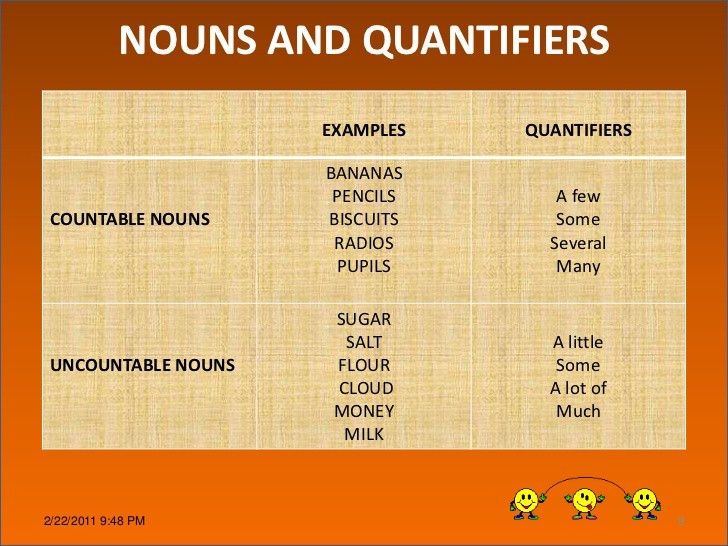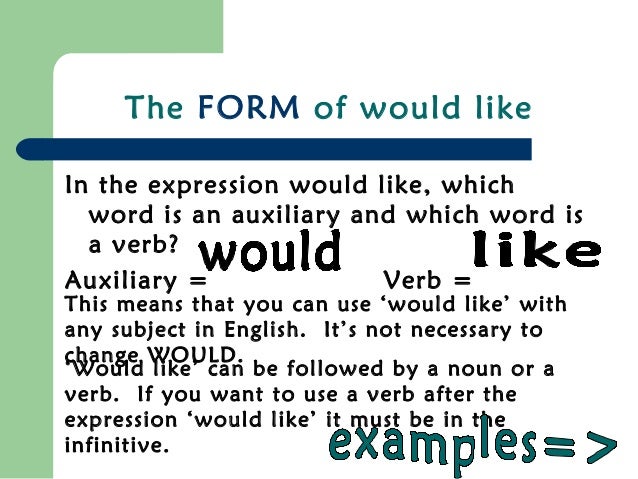Quantifiers
Los cuantificadores indican la cantidad de un nombre. Son repuestas a la pregunta “¿Cuántos?”. Al igual que los artículos, los cuantificadores definen a un nombre y siempre están situados delante del nombre. Algunos se pueden usar sólo con nombres contables, otros, sólo con nombres incontables y otros, con ambos.
Imagen de Quantifiers

Video de Quantifiers
Ejercicio de Quantifiers
Elige la respuesta correcta.
Expressing likes, desires, and preferences
PREFER
Para hablar de preferencias en general, usamos el verbo prefer seguido de verbo acabado en -ing o de infinitivo con to sin que cambie el significado.
I prefer buying online = I prefer to buy online
(prefiero comprar por internet)
También podemos indicar que preferimos una cosa a otra con la siguiente estructura:
Sujeto + prefer + sustantivo + to + sustantivo
I prefer tea to coffe (prefiero el té al café)
Para decir que preferimos hacer una cosa a hacer otra podemos usar las siguientes estructuras:
Sujeto + prefer + verbo acabado en -ing + TO + verbo acabado en -ing
I prefer going to the cinema to staying at home.
(prefiero ir al cine a quedarme en casa)
Sujeto + prefer + infinitivo con to + RATHER THAN + infinitivo sin to
I prefer to read rather than watch TV
(prefiero leer a ver la televisión)
WOULD RATHER
Significa prefiero o preferiría y va seguido de infinitivo sin to (bare infinitive).
Shall we go shopping? I would rather go to the cinema.
(¿Vamos de compras? Prefiero / preferiría ir al cine)
Forma abreviada: I'd rather go out (prefiero / preferiría salir)
Para decir que preferimos hacer una cosa a hacer otra usamos la siguiente estructura:
Sujeto + would rather + infinitivo sin to + THAN + infinitivo sin to
She would rather go out than stay at home.
(ella prefiere/ preferiría salir a quedarse en casa)
WOULD PREFER
También significa prefiero o preferiría y va seguido de infinitivo con to. Es más formal que would rather.
Shall we go shopping? I would prefer to go to the cinema.
(¿Vamos de compras? Prefiero / preferiría ir al cine)
Forma abreviada: I'd prefer to go out (prefiero / preferiría salir)
Para decir que preferimos hacer una cosa a hacer otra usamos la siguiente estructura:
Sujeto + would prefer + infinitivo con to + RATHER THAN + infinitivo sin to
They would prefer to travel to London rather than go skiing.
(ellos prefieren / preferirían viajar a Londres que ir a esquiar)
¡Cuidado!
- Después de than o rather than siempre va un infinitivo sin to (bare infinitive)
(Prefiero viajar en tren a conducir)
I prefer to travel by train rather than drive.
I would rather travel by train than drive.
I would prefer to travel by train rather than drive.
Imagen de Expressing likes, desires, and preferences

Video de Expressing likes, desires, and preferences
Ejercicio de Expressing likes, desires, and preferences
1.Love: amar, encantar. Like: gustar. Dislike: no gustar. Hate: odiar.
2. She likes to play the guitar. A ella le gusta tocar guitarra.
3. We dislike watching movies at night. No nos gusta ver películas en la noche.
4.They hate cooking / to cook in the morning. Ellos odian cocinar en la mañana.
5. She loves singing / to sing with her friends. A ella le encanta cantar con sus amigos.
6. He doesn’t like waiting / to wait for her wife. A él no le gusta esperar (wait) a su esposa
7. They hate listening to music in the car. Ellos odian escuchar música en el auto.
8. I like to wake up early every day. Me gusta despertarme temprano todos los días.
Gerund phrases as subject and object
GERUND PHRASES AS SUBJECT AND OBJECT
En esta gramática explicamos la formación de oraciones con frases-gerundio como sujetos y como objetos.
Es importante recordar que un gerundio es la forma –ING de un verbo (working, directing, etc). Este gerundio puede ser utilizado como sustantivo y, de ese modo, como sujeto u objeto de una oración.
Las frases-gerundio están integradas por la estructura
GERUND + NOUN(directing the news) o por una FRASE PREPOSICIONAL (working with computers).
Existen tres alternativas:
1.- COMO SUJETO DE UNA ORACIÓN
Being a teacher could be interesting.
Ser educador/a podría ser interesante.
1.- COMO SUJETO DE UNA ORACIÓN
Being a teacher could be interesting.
Ser educador/a podría ser interesante.
2.- COMO OBJETO DEL VERBO
I would like being a teacher.
Me gustaria ser educador/a
3.- COMO OBJETO DE UNA PREPOSICIÓN
I´m interested in being a teacher
Estoy interesado/a en ser educador/a
I would like being a teacher.
Me gustaria ser educador/a
3.- COMO OBJETO DE UNA PREPOSICIÓN
I´m interested in being a teacher
Estoy interesado/a en ser educador/a
GERUND PHRASES AS "SUBJECTS"
- Working in the media could be fun.
- Trabajar en los medios podría ser divertido.
- Designing interactive media seems challenging.
- Diseñar medios interactivos parece desafiante.
GERUND PHRASES AS "OBJECTS"
- I'd love working in the media.
- Me encantaría trabajar en los medios.
- I would hate directing the news.
- Odiaría dirigir el noticiero.
- I wouldn't like designing interactive media.
- No me gustaría diseñar medios interactivos.
- I'm interested in working with computers.
- Tengo interés en trabajar con computadoras.
Imagenes de Gerund phrases as subject and object

Video de Gerund phrases as subject and object
Ejercicios de Gerund phrases as subject and object
Comentarios
Publicar un comentario